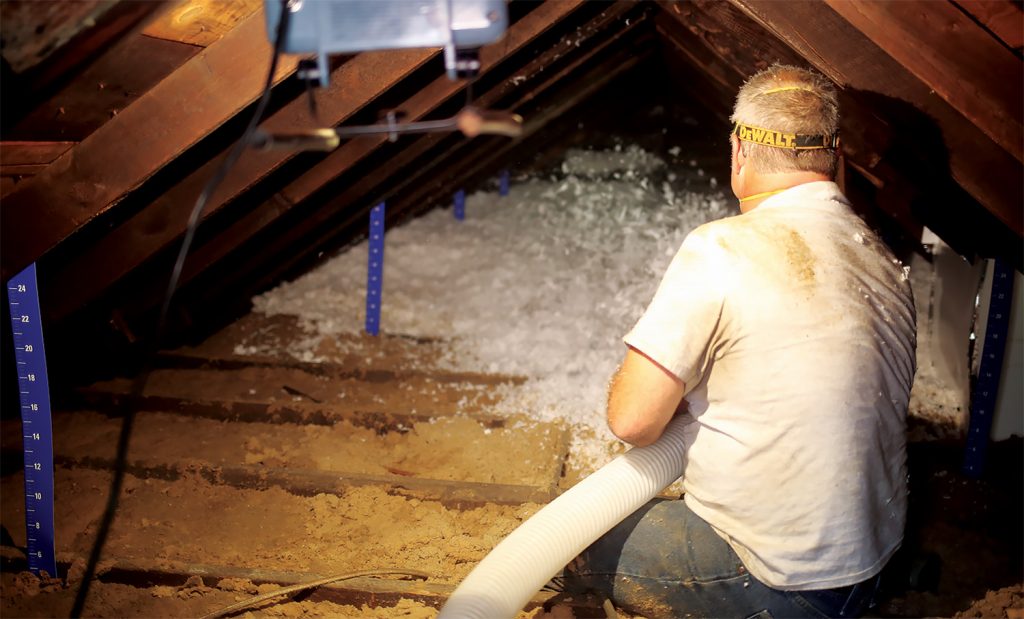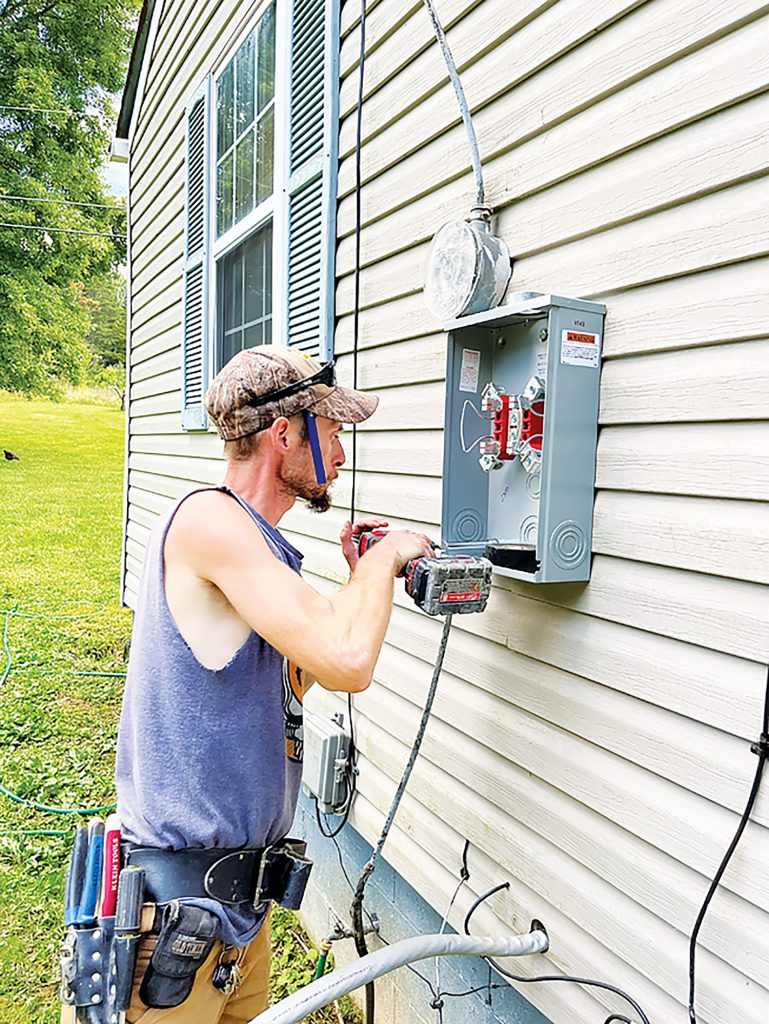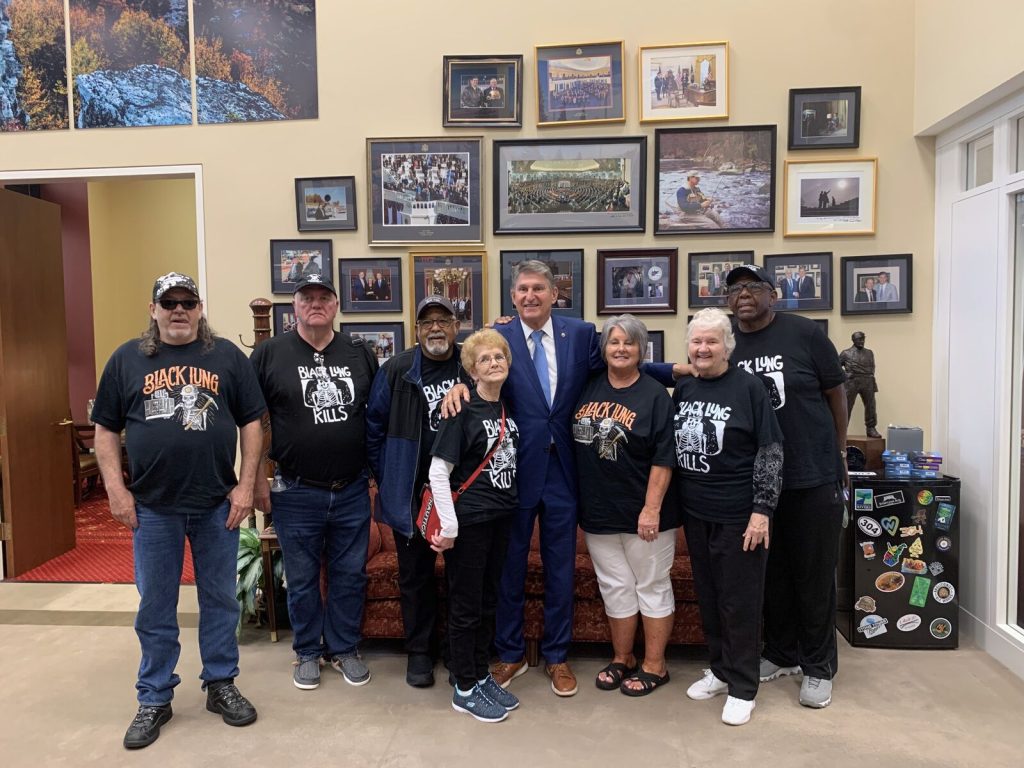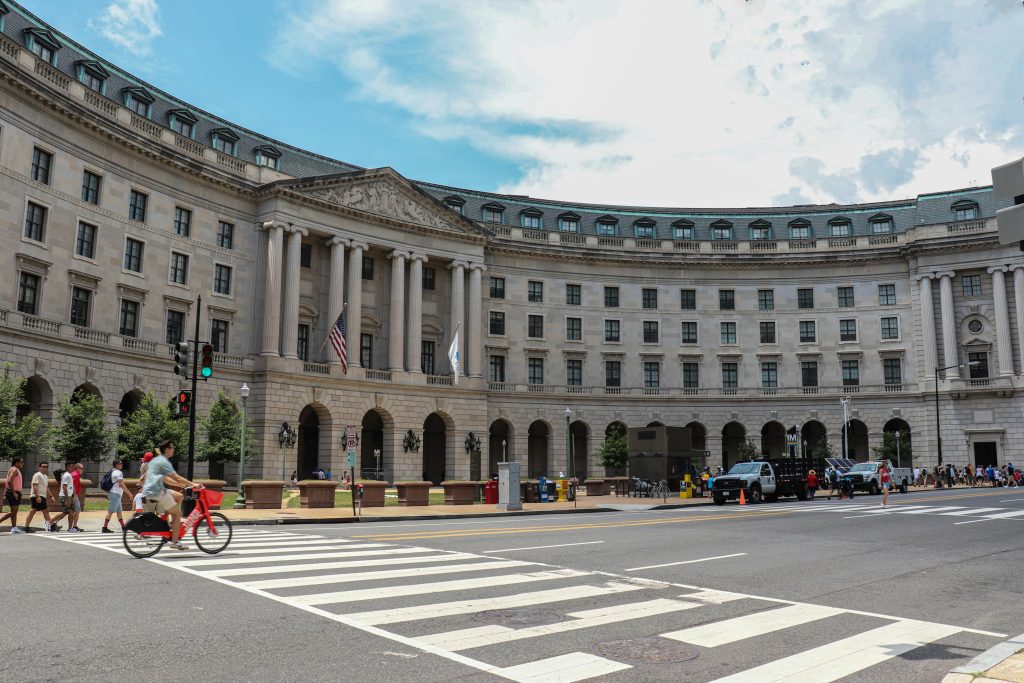By Megan Pettey

A Community Housing Partners weatherizaton technician insulates an attic. RGGI funds pay for money-saving upgrades for Virginia residents. Photo by Riley Schmitt/CHP
Dorothy Carter, a single grandmother in Elkton, Virginia, was raising kids on her own in a house suffering from immense disrepair. United Way connected her with Community Housing Partners, a nonprofit that provides home weatherization and energy efficiency assistance.
Challenges such as electrical and plumbing issues, sewage backed up in the basement, and a leaking roof prevented CHP Energy Solutions from doing necessary weatherization work that would improve the health of Carter’s home.
But because of Virginia’s membership in the Regional Greenhouse Gas Initiative, a 12-state cooperative effort to reduce climate-altering air emissions, there was a solution for Carter and her family. RGGI reduces carbon dioxide emissions using a system that requires utilities to pay for a shrinking number of allowances for carbon emissions. In Virginia, the revenue from those allowances funds home weatherization and flood prevention programs.
“RGGI funds the Weatherization Deferral Repair Program,” says Everett Brubaker with CHP Energy Solutions. “So we were able to work with local area contractors and actually do that repair, clear the basement, repair the roof, upgrade the electrical system to handle a high efficiency heat pump, and other measures to get that home ready.”
Following those improvements, Community Housing Partners was able to complete energy efficiency and weatherization work, which allowed Carter to stay in a home that was safe to live in, easier to maintain and had lower utility bills. But the funding that allowed Carter and her family to access these benefits may soon be gone in Virginia.
Weatherization 101
Keeping up with energy efficiency improvements is necessary for the health of a house and the health of homeowners, according to Chase Counts, senior director of operations at CHP Energy Solutions.
Without proper weatherproofing, Counts warns that excessive moisture can build up, creating conditions for asthma and other respiratory issues. Moisture problems can snowball over time, making it harder to maintain the home and creating higher energy bills and unsafe living conditions.
Weatherization protects the interior of a house from outside elements, like cold and hot air, moisture and ice damage. Making sure the air barrier around the home is airtight, ensuring there’s an insulated thermal barrier around the air barrier, providing adequate ventilation, assuring heating and cooling systems are functioning properly and checking that air duct systems are delivering conditioned air to where it needs to go can all protect one’s home while boosting energy savings.
Counts adds there are various do-it-yourself measures homeowners or renters can take to lower their utility bills.
“Weather stripping your door sweeps, your high-efficiency LED lighting upgrades, that’s a quick and easy win,” Counts says. “One of the big things that can be done is just installing some pipe insulation on your hot water pipes that are exposed and accessible.”
Additionally, homeowners can install low-flow showerheads and faucet aerators, which cut down both water usage and utility costs. According to the Environmental Protection Agency, the average household could save 2,700 gallons of water each year by installing shower heads that have a WaterSense label signifying the product meets the EPA’s criteria for water efficiency and performance.
However, Counts still suggests consulting a professional for even minor improvements to ensure everything is being safely installed while maximizing the home’s energy usage.
An Uncertain Future for the RGGI Home Repair Program
By funding the Weatherization Deferral Repair Program, RGGI finances the repairs that need to be done prior to a home receiving weatherization assistance. As a result, providers like CHP Energy Solutions are able to help significantly more homes in need.
Prior to the Weatherization Deferral Repair Program, a survey from the Association of Energy Conservation Professionals found that weatherization providers in the commonwealth had to defer approximately one in every five applicants because of necessary repairs now addressed by the deferral repair program, according to Counts.
The Weatherization Deferral RepairProgram in Virginia started in July 2021, after the state passed a law to join RGGI in 2020. As of July 2022, the program has completed 475 projects according to the Virginia Department of Housing And Community Development. As a result, energy efficiency and weatherization providers have been able to serve those most in need.

Quick AC Quote technicians install high-efficiency heat pumps at a home through the Weatherization Deferral Repair Program. Photo by Bradley Strahm/CHP
“I’m thinking about RGGI specifically, they’re reaching folks that historically we would’ve had to turn away,” Brubaker says, referring to individuals such as Dorothy Carter. “So these are clients that are now able to access the benefits of energy efficiency that many of us know; we know the lower bills, we know the healthier home, we know less missed days of school, we know about preserving housing stocks. RGGI is allowing those benefits to reach lower income households and more at-risk households. So that’s powerful stuff.”
Virginia Gov. Glenn Youngkin, who came into office after the commonwealth joined RGGI, has called the program “a regressive tax on families and businesses” and issued an executive order in January 2022 to withdraw Virginia from RGGI. The state published a final regulation on July 31 that will remove Virginia from the interstate compact by the end of the year, and Appalachian Voices was among the environmental groups that filed a notice of intent to sue to block that action.
As a sustainability program assistant for the City of Roanoke and the program coordinator for Healthy Homes Roanoke, Megan Root is very familiar with the impacts of RGGI on low-income energy efficiency programs in Virginia. According to Root, while the National Weatherization Program is federally funded, those funds are frequently insufficient and can’t be used to perform the repairs necessary before a home can receive weatherization services.
“Since joining RGGI, Virginia has received over $250 million to the Weatherization Deferral Repair Program, and there are no other alternative funding sources for this,” Root says.
If Gov. Youngkin succeeds in leaving RGGI, providers such as CHP Energy Solutions would not be able to help hundreds of households in need of their services, explains Counts.
According to Root, these services are crucial to make homes more comfortable and safe as extreme weather events become increasingly common as a result of climate change. Root also adds that 80% of the housing stock in Roanoke is pre-1940.
“A lot of [housing in Roanoke] is not weatherized properly, so people are having really high and low temperatures in their houses, which is just not comfortable — it’s not safe,” Root says.
“By being able to get these weatherization services they’re able to save money on their electricity bills but also just have that comfort in their home,” Root adds. “It really helps to even the playing field for low-income residents that are typically spending a higher percentage of their income on utility bills because affordable housing is usually not weatherized properly.”
Related Articles
Latest News

Leave a comment
Your email address will not be published. Required fields are marked *





